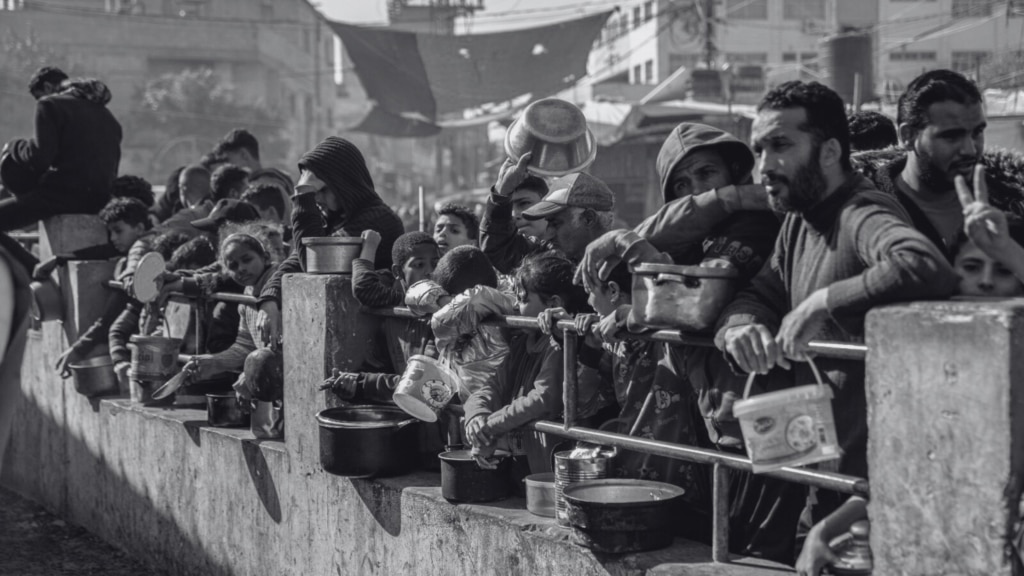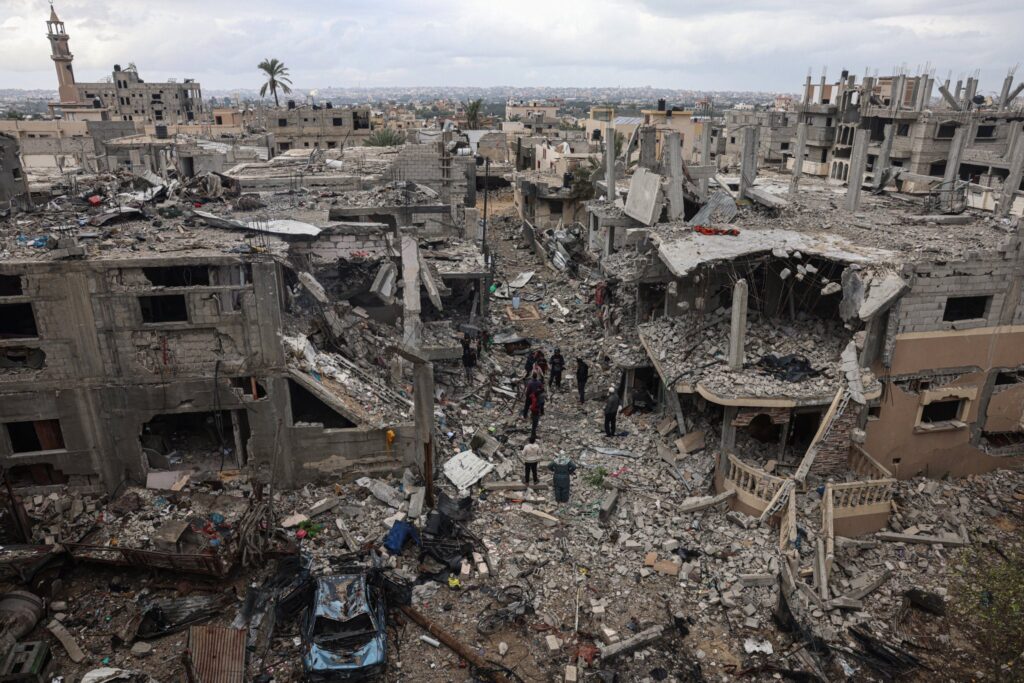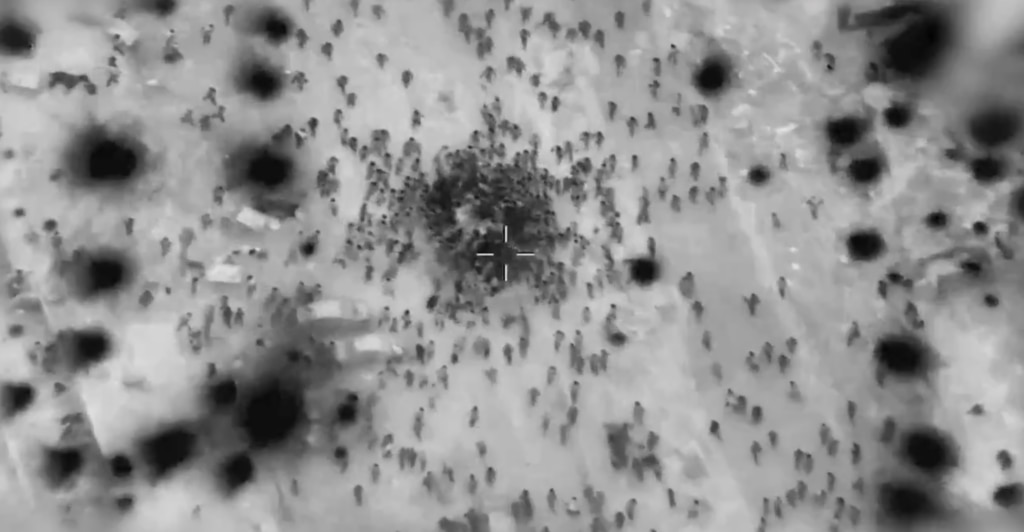Fazal Masood Malik, Canada

On a desperate search for food in Rafah, 20-year-old Muhannad Mu‘ayyad Abu Awwad made the ultimate sacrifice. A dedicated volunteer with Humanity First, Muhannad’s final moments weren’t spent seeking sustenance, but rather helping a mother and child in distress. As Israeli missiles struck, he, his friend, and those he tried to save were martyred. (Hazrat Khalifatul Masih Vaa, Friday Sermon, 13 Friday 2024)
Today, Gaza faces an unprecedented humanitarian crisis. The US Secretary of State, Antony Blinken’s stark assessment reveals a chilling reality:
“100 percent of the population in Gaza is at severe levels of acute food insecurity. That’s the first time an entire population has been so classified.” (“Israel to send team to D.C. to discuss Rafah; Blinken to return to Mideast”, washingtonpost.com, 19 March 2024)
While the world watches this catastrophe unfold in real-time through social media and news broadcasts, a dangerous indifference has settled over humanity. This calculated apathy, as millions feast in the midst of others’ starvation, threatens not just Palestinians but marks a profound moral failure of our civilisation.
History’s darkest chapters are often written in hunger. Ancient Rome’s siege of Carthage set a brutal precedent, but the weaponisation of hunger has deeper roots. Prophet Muhammadsa and his followers endured similar trials during the boycott of Banu Hashim in Mecca, where for three years they survived on leaves and roots, their faith tested but unbroken. (“The steadfastness of the Holy Prophet in the face of adversity”, alhakam.org, 8 November 2019)
The 20th century saw this weapon wielded with scientific precision; first, it was Stalin’s Holodomor in Ukraine, then Hitler’s calculated Hungerplan, and the siege of Leningrad claimed millions. The Bengal famine demonstrated colonial Britain’s mastery of manufactured hunger. (“Starving civilians is an ancient military tactic, but today it’s a war crime in Ukraine, Yemen, Tigray and elsewhere”, theconversation.com, 21 June 2022)

Today, in a profound historical irony, Israel’s Prime Minister Benjamin Netanyahu joins these architects of death by starvation in the halls of shame.
Contemporary conflicts continue this brutal legacy. Yemen faces a devastating blockade by Saudi and Emirati forces, while Houthi forces confiscate food and medicine. Ethiopia’s Tigray region saw 375,000 deaths from manufactured famine. (“Hunger as a Weapon: A war strategy from Sudan to Gaza”, worldpeacefoundation.org, 15 October 2024)
In Sudan, warring generals Hemedti and al-Burhan have plunged the country into famine by destroying infrastructure and blocking aid, while Russia’s invasion of Ukraine disrupts global food security. (“When will one of humanity’s gravest crimes be confronted?”, alhakam.org, 9 May 2024; “Countries’ vulnerability to food supply disruptions caused by the Russia-Ukraine war from a trade dependency perspective, nature.com, 3 October 2023)
These modern atrocities mock the sacred duty entrusted to human beings from the time of Adamas. The Holy Quran’s command is unmistakably clear: “And they feed, for love of Him, the poor, the orphan, and the prisoner.” (Surah al-Dahr, Ch.76: V.9)
Islamic teachings explicitly forbid the destruction of food sources and vegetation, even during warfare. Hazrat Abu Bakr’sra instructions to the Muslim army were clear: “Do not destroy palm trees, do not burn [enemy] fields or homes, do not cut down fruit-bearing trees …” (“Comparative Religious Teachings on War and Peace, alislam.org) [https://www.alislam.org/articles/comparative-religious-teachings-war-peace/]

Prophet Muhammadsa further emphasised this by warning, “Whoever cuts a lote-tree [without justification], Allah will send him to the Hellfire.” (Sunan Abu Dawud, Kitab al-Adab, Hadith 5239)
This divine instruction stands in stark contrast to those who weaponise hunger despite the UN’s resolution condemning such tactics. (“Security Council Adopts Presidential Statement Addressing Conflict-Induced Food Insecurity in Situations of Armed Conflict”, press.un.org, 3 August 2023)
Today’s Palestinians, like David facing Goliath (Samuel I, 17:1-58), confront overwhelming odds. The parallel extends deeper – just as David’s victory came through unwavering faith rather than military might, and as Moses’as triumph over the Amalekites (Exodus, 17:8-16) came through divine intervention while his hands were raised in prayer, today’s victory will come when we submit ourselves to the will of Allah the Exalted.
The systematic destruction of Gaza’s agricultural infrastructure and food supplies represents not only a violation of international law but a complete departure from these ancient religious principles that protected sustenance even during warfare. (“Gaza: Israel’s destruction of hundreds of dunams of agricultural land is expression of its insistence on committing genocide”, reliefweb.net, 5 October 2024)

These biblical accounts, ironically, should resonate most deeply with those now inflicting similar suffering on Gaza.
The solution demands both spiritual and practical action. While the Promised Messiahas teaches that true victory comes through spiritual warfare and complete submission to Allah’s will, this crisis demands immediate international intervention. The world’s governments must act decisively to stop this genocide. Economic sanctions, diplomatic pressure, and humanitarian intervention are not merely options but moral imperatives.
Muhannad’s sacrifice reminds us that even in the darkest hours, human dignity and compassion can prevail. His story challenges us to act against the use of starvation as a weapon of war and to remember that true strength lies not in causing suffering, but in alleviating it.
Humanity stands at a crossroads. In a world increasingly defined by military might and moral abdication, our response to Gaza’s manufactured famine will reveal more than just our political allegiances. It will serve as a referendum on our collective conscience. Should we choose the path of indifference, when future Goliaths march toward our homes, our pleas for mercy will carry all the weight of dust beneath their feet.

